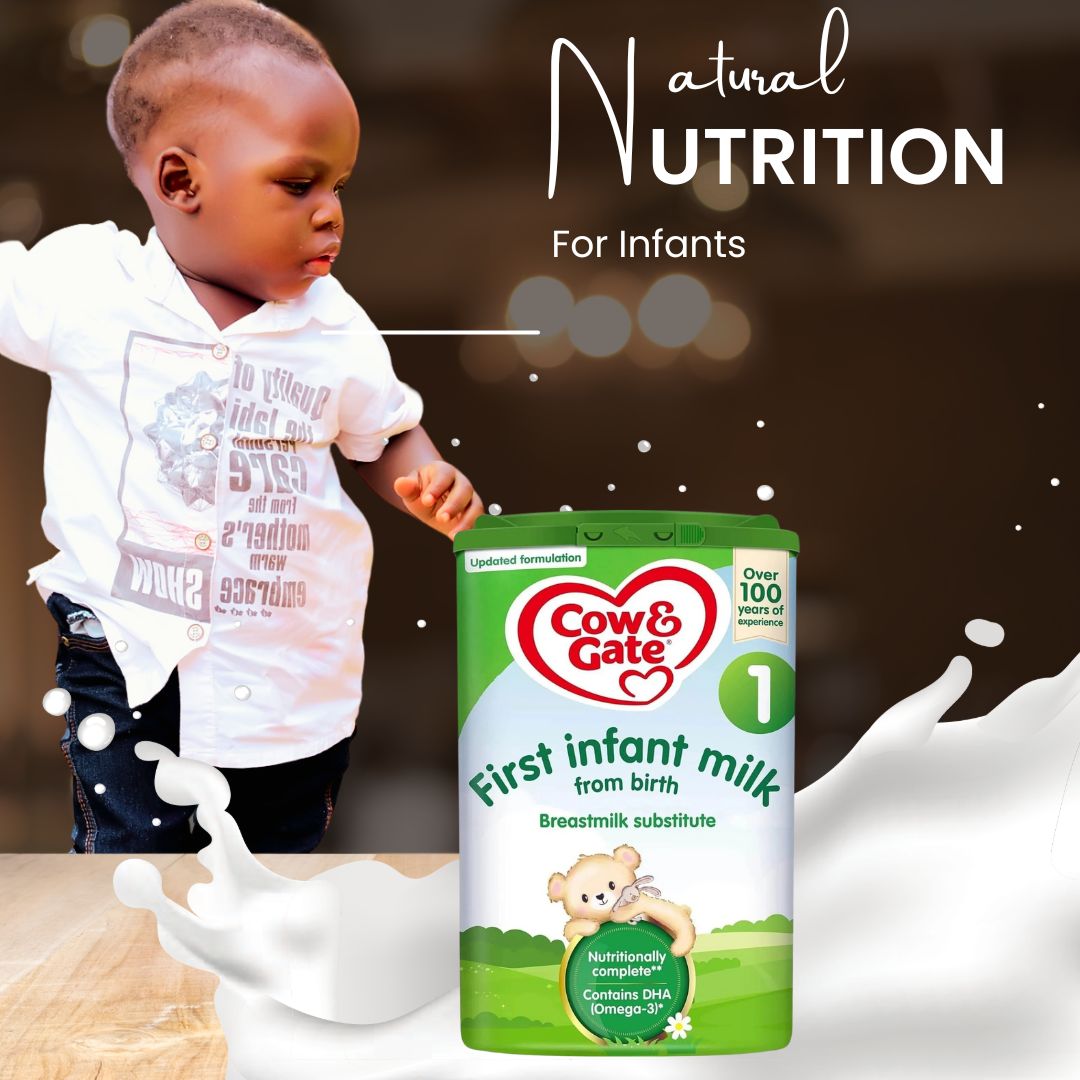An overview of Iron-fortified baby formula
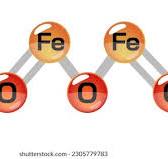
Why Iron-Fortified Baby Formula?
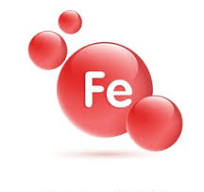
-
Iron is crucial for infants because it an essential part of red blood cells which carry oxygen through out the body. Infants need iron to support healthy growth and development, including brain function and the immune system. Iron deficiency can lead to various issues, including anemia, slowed growth, and developmental delays.Here’s why iron is so important for infants:
-
Oxygen Transport:Iron is essential for producing hemoglobin, a protein in red blood cells that carries oxygen from the lungs to the rest of the body. Without enough iron, the body can’t produce enough red blood cells, leading to anemia and oxygen deficiency.

Iron-fortified baby formula -
Brain Development:Iron plays a critical role in brain development and function. Infants with iron deficiency may experience slower brain development, reduced attention and memory, and impaired visual and auditory systems.

Iron-fortified baby formula -
Immune Function:Iron deficiency can weaken the immune system, making infants more susceptible to infections.
-
Energy Levels:Iron is needed for the body to produce energy, which is essential for growth and activity.
-
Preventing Iron Deficiency Anemia:Iron deficiency anemia can lead to fatigue, irritability, and pale skin in babies.Gut IntegrityIron and gut microbiota have a complex mutually influencing relationship. Iron is essential for many bacterial functions, and the gut microbiome can impact iron absorption and metabolism
Ensuring Adequate Iron Intake in breastfed babies
Iron in breast milk is highly bioavailable, meaning a larger percentage of the iron is absorbed by the infant than in other sources like formula or cow’s milk.Breastfed infants can absorb up to 50% of the iron in breast milk, compared to a 7-12% absorption rate for formula-fed infants. This high bioavailability helps breastfed infants meet their iron needs and may reduce the risk of iron deficiency.Here’s a more detailed explanation:-
High Bioavailability:Iron in breast milk is more readily absorbed by the infant’s body compared to iron in other sources like cow’s milk-based formulas.
-
Protective Factors:Breast milk contains factors that enhance iron absorption, such as lactoferrin, which can help the iron bind to receptors in the gut for absorption.
-
Impact on Iron Stores:Breastfed infants tend to have greater iron stores at 6 months of age compared to those fed cow’s milk formulas, likely due to the higher iron absorption rate from breast milk.
-
Maternal Iron Status:A mother’s iron stores during pregnancy can influence the iron endowment of the infant at birth, which can also impact the infant’s iron status later in life.
-
Iron Absorption Mechanisms:Iron absorption in breast-fed infants involves several steps, including the reduction of Fe3+ to Fe2+, transport across the intestinal cells, and storage in the body.
Breast milk has lower iron levels than formula but, and infants may not get enough from breast milk alone if supplemented with iron-fortified formula. -
-
Benefits of Iron-fortified baby formula
- Prevents Iron Deficiency: Helps infants meet their iron needs during their first year of life if not breastfed
- Supports Overall Growth and Development: Iron is essential for various bodily functions, including red blood cell production and oxygen transport.
- May Improve Cognitive Function: Research suggests that iron supplementation can have a positive impact on cognitive development.
Cautions and Concerns on Iron-fortified baby formula
-
Excessive Iron:While iron-fortified formula is generally safe for infants, excessive iron intake can be harmful, particularly in adults. In babies with satisfactory iron levels, high-iron formula may be unnecessary or even detrimental.
-
Individual Needs:Infants may have different iron needs based on their individual health status, so it’s crucial to consult with a healthcare professional for personalized recommendations.
-
Breast Milk:Breast milk is the preferred source of nutrition for infants, and iron-fortified formula can be used as a supplement if necessary
Comparing iron absorption in breastmilk and
Iron-fortified baby formula
|
Component |
Breast milk |
Iron fortified Baby Formula |
|
Type of Iron |
Iron absorption in breast-fed infants involves a simple absorption of Fe2+ which is available at a rate of nearly 70% |
Iron is present in different oxidation states like Fe3+ hence the need to convert it to Fe2+ reducing the rate to nearly 30% |
|
Bioavailability |
High bioavailability due to less binding compounds |
Low bioavailability as most of the iron is bound to other nutrients like calcium |
|
Risk of toxicity |
A natural combination just adequate for a healthy baby |
Since individual iron needs differ, there is a risk of toxicity |
|
Enhancers |
It has natural enhancers such as lactoferrin, which can help the iron bind to receptors in the gut for absorption. |
Enhancers differ from one brand to another causing a difference in efficiency |
|
Amount of iron |
The low amount of iron is just sufficient for absorption |
The excess iron which is not absorbed can be used by pathogenic bacteria causing infections |
Choosing the best Iron-fortified baby formula
Iron is a key component of hemoglobin, the protein in red blood cells that carries oxygen throughout the body. It is also involved in various metabolic processes, including the synthesis of neurotransmitters, which are crucial for brain function. A deficiency in iron can lead to iron deficiency anemia, which can result in fatigue, weakness, and developmental delays in infants. The basic considerations should be made
Ferrous Sulphate. The most widely used and generally well-tolerated form of iron. While other forms like lactoferrin and iron bisglycinate are also used, ferrous sulfate remains the “gold standard” due to its cost-effectiveness and established safety profile. The existence of iron in the oxidation state of Fe2+ makes it highly bioavailable.
Vitamin C
Formulas often incorporate strategies to enhance iron absorption, such as adding Vitamin C, which keeps iron in a more bioavailable state.
HMOs (Human Milk Oligosaccharides)
Breast milk contains a unique blend of oligosaccharides called Human Milk Oligosaccharides (HMOs).These may not be incorporated in some formulas. However, a combination of GOS (galacto-oligosaccharides) and FOS (fructo-oligosaccharides) added to infant formula as prebiotics can mimic some of the beneficial effects of HMOs.
Why infants require iron
According to health experts, infants require a sufficient amount of iron for several reasons:
-
-
Cognitive Development: Iron is vital for proper brain development and function. Sufficient iron levels in infancy can lead to better cognitive outcomes in later childhood.
-
-
-
Immune Function: Iron plays an essential role in the immune system, helping to protect the body against infections and diseases.
-
-
-
Physical Growth: As babies grow rapidly during their first year, they need adequate nutrition, including iron, to support their increasing bodily functions.
-
Examples of Iron-fortified baby formulas
-
Aptamil
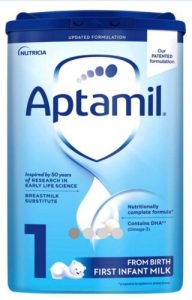
Cow and Gate

Natural Sources of Iron
Iron can be found in numerous foods, with two main types:
-
-
Heme Iron: This type of iron is found in animal products such as meat, poultry, and fish and is more readily absorbed by the body.
-

Iron-fortified baby formula
-
-
-
Non-Heme Iron: Found in plant-based foods like beans, lentils, tofu, and fortified cereals. This type of iron is not as easily absorbed, making it critical to consume it alongside vitamin C-rich foods to enhance absorption.
-

Benefits of Iron-Fortified Baby Formula
Iron-fortified baby formulas offer several benefits:
-
-
Prevention of Iron Deficiency: The primary advantage of iron-fortified formulas is their ability to help prevent iron deficiency anemia by providing a readily available source of iron.
-
-
-
Convenience: For parents who cannot breastfeed or choose formula feeding, iron-fortified formulas offer a convenient way to ensure their baby receives adequate iron without the need for additional supplementation.
-
-
-
Balanced Nutrition: These formulas are designed to provide comprehensive nutrition, including appropriate balances of carbohydrates, fats, and proteins, along with essential vitamins and minerals.
-
Special considerations for Choosing the Right Iron-Fortified Formula
When selecting an iron-fortified baby formula, parents should consider the following:
-
-
Age Appropriateness: Ensure the formula is suitable for your baby’s age group, as different formulas cater to specific developmental stages.
-
-
-
Ingredients: Look for high-quality ingredients with appropriate iron levels and avoid those with unnecessary additives or artificial preservatives.
-
-
-
Consulting Healthcare Professionals: Always seek advice from a pediatrician or nutritionist before making significant dietary changes for your infant.
-
Conclusion
Iron is a vital nutrient for infants, contributing to their growth, cognitive development, and overall health. Iron-fortified baby formulas provide a convenient and effective means to ensure that infants receive adequate levels of this essential mineral, particularly for those who are not breastfed. By understanding the importance of iron and making informed choices, parents can help support their baby’s nutritional needs and promote healthy development.

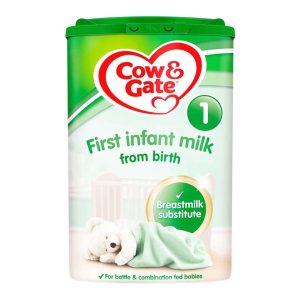 Cow and Gate 1 800g
Cow and Gate 1 800g 
